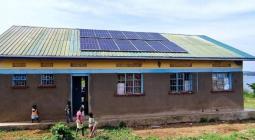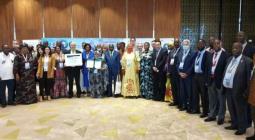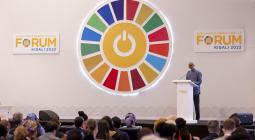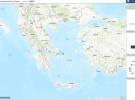Here’s what east Africa has to do to balance trade with the EU
Member states of the east African trade bloc will have to work on a number of requirements that they are scoring low if they are to fully benefit from European Union’s 447 million market.
During a workshop organized by the Stockholm Environment Institute (SEI) and the East African Science and Technology Commission, it emerged that the eight members of the East African Community are showing progress but are still unable to erase critical trade inhibitors.
A scoping report presented by SEI disclosed that the bloc is struggling with job creation, taming corruption, climate resilience, innovation, infrastructural development, attracting foreign direct investment and controlling currency volatility.
“On average, east Africa is scoring low in the EU and Carbon Border Adjustment Mechanism (CBAM) policy indicators for macro economy, environment, social protection and governance,” Dr Anderson Kehbila of SEI told attendees.
East Africa Community will have to fight corruption, create a data law and guard against currency volatilty to strike a trade balance with the EU
To achieve optimum trade balance with the EU, Kenya, Tanzania, Uganda, Rwanda, Burundi, Democratic Republic of Congo, Ethiopia and South Sudan will need to show more efforts in prosecuting corrupt trade players in the East Africa Court of Justice while domesticating laws enacted by the East African Legislative Council, participants said.
Trade laws should not be made in isolation. Rules of origin, fair trade, carbon emission requirements, currency volatility revaluations and financing frameworks need strengthening
The question of data residence arose in a period where Africa is finding it difficult to enact data protection laws to protect business data against siphoning to foreign countries. But just like the EU has the General Data Protection Regulations (GDPR), east Africa was urged to have a regional data law to boost online trade between both regions.
The Kenya National Chamber of Commerce and Industry (KNCCI) and SEI are jointly implementing the European-funded Switch Africa Green program but significant risks to international cooperation in both trade and climate change areas threaten to slow down the implementation of the proposed CBAM by the EU.
“Trade laws should not be made in isolation. Rules of origin, fair trade, carbon emission requirements, currency volatility revaluations and financing frameworks need strengthening,” said Caroline Cherop, head of trade at KNCCI.
Deputy director of Industries at the Ministry of Industrialization and Trade in Kenya King’uru Wahome said to trade better with the EU, east Africa must improve the skill sets of its workforce and draw more women into technology.
“Job creation needs continuous training and more budgets in research and development.”
Prof George Outa of the Technical University of Kenya emphasized that east Africa will require more awareness and capacity building if the proposals are to be realized.
Achieving a climate trade balance could be east Africa’s biggest challenge
Another critical aspect of trade discussed was the lack of commitment by east African business leaders are employing to create a climate-friendly environment between them and their EU counterparts.
World Bank data indicates that developing countries will need about $100 billion of new investments per year over the next 40 years to build resilience to the effects of climate change. Mitigation costs are expected to be in the range of $140–$175 billion per year by 2030.
SEI Africa centre director Dr Philip Osano urged east African governments to use digital tools such as the Trase software which is helping governments to improve the sustainability of their supply chains.
“It helps to monitor progress against sustainability goals. It identifies hotspots, business people and supply chains most closely linked to impacts of carbon emissions. It is easier to take action,” he said.
The European Green Deal targets to reduce carbon emissions by 55% by 2030 while aiming to become a carbon-neutral continent by 2050. CBAM is EU’s core strategy to achieve this.
Corruption and excessive red tape have been stifling investments in renewable energy and other climate-friendly projects in east Africa while state subsidies for fossil fuels keep prices artificially low, making it hard for renewables to compete.
Paul Muchiri, youth director at KNCCI said east African governments must remove these barriers and create an environment in which the private sector can thrive and investments in renewable energy make financial sense.
“The private sector should play a role in pushing for these reforms, which have the potential to unlock billions of dollars’ worth of investment opportunities,” said Muchiri.
Faustine Ngila | https://qz.com/






